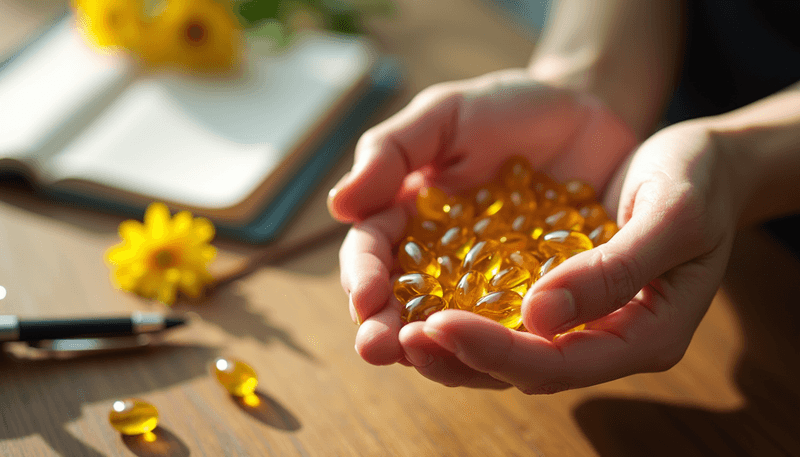Evening Primrose Oil: PCOS Game-Changer

Ladies, gather 'round! If you're one of the millions of women grappling with Polycystic Ovary Syndrome (PCOS), I've got some exciting news that might just make your day. A recent study has shed light on a potential game-changer in the PCOS world: evening primrose oil. As a fellow woman who's navigated the choppy waters of hormonal imbalances, I couldn't wait to dive into this research and share its insights with you.
The study, titled "Effect of Evening Primrose Oil on Hyperandrogenism Markers in Women With Polycystic Ovarian Syndrome," explored how this natural supplement might help manage PCOS symptoms. Let's break down the key findings and see how they could potentially transform your PCOS journey.
Evening Primrose Oil: A Natural Hormone Balancer
First things first, let's talk about what evening primrose oil (EPO) actually is. This golden elixir is extracted from the seeds of the evening primrose plant, known for its delicate yellow flowers that bloom in the evening (hence the name). But don't let its dainty appearance fool you – this oil packs a powerful punch when it comes to hormonal health.
The secret lies in its rich content of gamma-linolenic acid (GLA), an omega-6 fatty acid that our bodies use to produce prostaglandins. Think of prostaglandins as your body's internal messaging system, helping to regulate inflammation, pain, and yes – hormonal balance.
"Could the key to managing PCOS symptoms be found in a simple flower?"
In the study, women who took 1000mg of EPO daily for 10 weeks showed significant improvements in several key areas. Let's break it down:
-
Hormonal Harmony: The study found that EPO helped reduce levels of luteinizing hormone (LH) and follicle-stimulating hormone (FSH). For those of us with PCOS, these hormones are often out of whack, leading to those frustrating symptoms we know all too well.
-
Taming Testosterone: EPO also helped lower testosterone levels. High testosterone is often the culprit behind some of PCOS's most bothersome symptoms, like excess hair growth and acne.
-
Estrogen Boost: Interestingly, while lowering some hormones, EPO actually increased estrogen levels. This is great news for those of us dealing with irregular periods or fertility issues.
So, how can you put this knowledge into action? Consider talking to your healthcare provider about incorporating EPO into your PCOS management plan. Start with a low dose and gradually increase to 1000mg daily, as used in the study. Remember, consistency is key – give it time to work its magic!
Weight Management Made Easier
Now, let's talk about a topic that's often a sore spot for many of us with PCOS – weight management. The study brought some encouraging news on this front too!
Participants who took EPO saw a significant reduction in their BMI and overall weight. On average, they lost about 18% of their body weight over the 10-week period. That's impressive, especially considering how stubborn PCOS-related weight can be.
But how does EPO work its magic on our waistlines? It all comes down to leptin, the hormone that regulates hunger and metabolism. EPO appears to decrease the production and secretion of leptin in the blood plasma. This might sound counterintuitive at first – isn't leptin supposed to help us feel full?
Here's where it gets interesting. In PCOS, we often develop leptin resistance, meaning our bodies don't respond properly to leptin's signals. By reducing leptin levels, EPO might actually be helping to reset our body's sensitivity to this important hormone.
"Imagine if managing your weight with PCOS felt less like an uphill battle and more like a gentle hike."
So, how can you harness this potential benefit? Here are some practical tips:
- Combine EPO with a balanced diet: Focus on whole foods, lean proteins, and plenty of vegetables.
- Stay active: Even moderate exercise like brisk walking can complement EPO's effects.
- Be patient: Remember, sustainable weight loss takes time. Celebrate small victories along the way!
Personal anecdote time: When I first started taking EPO, I didn't notice much change on the scale at first. But about a month in, I realized my clothes were fitting a bit looser, and I had more energy for my weekly yoga classes. It wasn't a dramatic overnight change, but those small improvements added up over time.
Taming the Wild Hairs of PCOS
Let's face it – unwanted hair growth (hello, hirsutism!) is one of the most visible and often distressing symptoms of PCOS. The good news? The study showed that EPO might help in this department too.
Participants reported a noticeable reduction in visible hair growth on their face, chin, and upper lip areas after taking EPO for 10 weeks. While it didn't completely eliminate the issue, many women found the improvement significant enough to boost their confidence.
So, what's the science behind this hair-raising (or should we say, hair-reducing) effect? It all comes back to those androgens, particularly testosterone. By helping to lower testosterone levels, EPO may be indirectly addressing one of the root causes of excess hair growth in PCOS.
Here's how you might incorporate this insight into your daily routine:
- Patience is key: Hair growth cycles take time, so don't expect overnight results. Give it at least 2-3 months before evaluating the effects.
- Combine approaches: While taking EPO, continue with your preferred hair removal methods. You might find you need to use them less frequently over time.
- Document your progress: Take photos (for your eyes only!) or keep a journal to track changes. Sometimes improvements are so gradual we don't notice them day-to-day.
"What if managing PCOS-related hair growth felt less like a constant battle and more like a manageable part of your routine?"
Remember, everyone's experience with PCOS is unique. What works wonders for one person might have a more subtle effect on another. The key is to approach it with an open mind and a willingness to experiment (safely, of course!).
Cholesterol: The Unexpected Bonus
Here's a pleasant surprise from the study – EPO also showed benefits for cholesterol levels. Participants who took EPO saw a significant decrease in both LDL (the "bad" cholesterol) and total cholesterol levels.
Why does this matter for PCOS? Well, women with PCOS are at a higher risk for cardiovascular issues, partly due to the hormonal imbalances that can affect our lipid profiles. By helping to improve cholesterol levels, EPO might be offering an extra layer of protection for our heart health.
Think of it this way: EPO is like a multitasking superhero for your body. While it's busy balancing hormones and managing symptoms, it's also giving your cardiovascular system a little TLC.
Here's how you can make the most of this cholesterol-lowering effect:
- Get your levels checked: Before starting EPO, get a baseline lipid panel. Then, after a few months of consistent use, test again to see your progress.
- Heart-healthy habits: Complement EPO's effects with a diet rich in omega-3s (think fatty fish, walnuts, and flaxseeds) and regular cardiovascular exercise.
- Spread the word: If you have family members with PCOS or cholesterol concerns, share this information. It could be beneficial for them too!
"Imagine tackling PCOS symptoms and supporting your heart health with one natural supplement. Too good to be true?"
Now, I know what you might be thinking – "This sounds great, but are there any downsides?" It's a fair question, and one I always ask when considering new treatments. The good news is that the study reported very few side effects. A small number of participants experienced mild issues like nausea, diarrhea, or headaches, mainly in the first couple of weeks. These generally resolved on their own.
As always, it's crucial to consult with your healthcare provider before starting any new supplement, especially if you're taking other medications. They can help you determine the right dosage and monitor your progress.
In conclusion, evening primrose oil shows promising potential as a natural ally in managing PCOS symptoms. From balancing hormones and aiding weight management to reducing unwanted hair growth and improving cholesterol levels, it seems to offer a multifaceted approach to PCOS care.
Remember, managing PCOS is a journey, not a destination. It's about finding what works for you and embracing the small victories along the way. EPO might be one more tool to add to your PCOS management toolkit.
So, here's my challenge to you: If you're intrigued by these findings, why not give EPO a try? Start a conversation with your healthcare provider, do your research, and see if it might be a good fit for your PCOS management plan. Who knows? You might just find yourself blooming like an evening primrose – resilient, beautiful, and thriving despite the challenges.
"Ready to take control of your PCOS journey? Why not start with a little evening primrose magic?"

Dr. Anya Sharma, MD
Dr. Anya Sharma is a board-certified gynecologist with over a decade of experience specializing in women's health and patient education. She graduated from Johns Hopkins School of Medicine and completed her residency in Obstetrics and Gynecology at a top hospital in New York City. With a passion for empowering women, Anya transitioned to content creation to provide accessible, evidence-based information on health topics relevant to mid-aged women. Her empathetic and pragmatic approach combines medical expertise with relatable insights, making her a trusted voice in the field.







